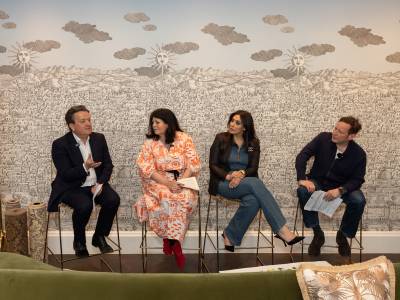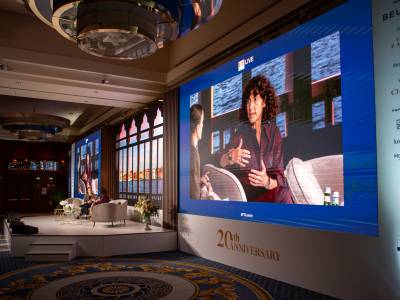FT Weekend Festival 2023: Succession of Big Ideas
13th September 2023
The FT Weekend Festival 2023 was a day packed with stimulation and the odd scoop. Speakers included politicians, authors, chefs, historians, photographers, podcasters, economists, globetrotters and commentators, all hosted by sparky FT writers. SPHERE was lucky to be in the front row and here we give some highlights for our readers.
The temperature at Kenwood House on Hampstead Heath on 2 September was not excessive solely on account of the weather. The collective brains of the FT Weekend Festival 2023 were in overdrive, thanks to a plethora of interesting speakers and a lively and curious audience. Curious as in inquisitive, that is. FT readers are of course a well-heeled, well-behaved bunch, myself included. Although there was a cool frisson when Shadow Chancellor Rachel Reeves’ speech was disrupted by a pair of youthful protestors bearing signs ‘Fund our Future’ and ‘Tax Wealth Now’, before they were escorted out of the Big Tent.
FT Weekend Festival 2023 Highlights
Where else would the former Head of MI6 and a Master of Wine come together? It’s a plot worthy of Mick Herron of Slough House fame, who just happened to be one of the speakers at FT Weekend Festival 2023. Where else would Jesse Armstrong, screenwriter for the cult TV series ‘Succession’, reveal the secret behind a mystery that has perplexed Succession fans in the final series?
Succession: Where Money meets Ego
Succession Screenwriter Jesse Armstrong and Henry Mance, FT Chief Features Editor
Jesse Armstrong was far more candid than in previous media interviews, partly because the series has reached its climactic end and partly on account of Henry Mance’s probing, but charismatic interview technique. The rapport between the two was tangible. The highlight of this session was the unravelling of a mystery which baffled Succession fans in Episode 4 of the Final Season (spoiler alert!).
A typed document is found that appears to name Kendall as the successor to Logan, and heir apparent of the media empire. But a line hand drawn in pen started underneath the name and then appeared to strike through it. Did Logan mean to underline Kendall’s name or cross it out? A source of much speculation.
Jesse Armstrong: This is the sort of thing I would have hated to do while we were still doing the show. But if you were going to cross out, you wouldn’t start out underneath, would you?
Mystery solved.
Our British Obsession with Spies
Author Mick Herron of ‘Slow Horses’ fame in conversation with FT Literary Editor Frederick Studemann
The thriller novelist talks about his spy genre and reveals that his Slough House series will eventually come to an end. But no time soon.
Frederick Studemann: You’ve said you have never been a spy. What is it about this genre for you? There seems to be a very British obsession with ‘spyery’, an Elizabethan term.
Mick Herron: Spyery – I like that. I’ve certainly always denied having been a spy, but of course you do hear stories…
A friend of mine was approached at the Harrogate Crime Festival a couple of weeks ago by a woman, whom he'd never met but she told him that she knew for a fact that I definitely used to work for GCHQ. Now I don't remember ever working for GCHQ. But you have to wonder who should you trust.
It’s a trite enough conversation that we all wear masks. We’re all different people in private than we are in public. I'm a different person sitting on stage than I am in my everyday life. So one of the attractions of the espionage novel is that notion that some spies, not all, adopt other identities. There is something quite liberating abut that that one can shake off one’s everyday life and just become another individual entirely. I’m sure that’s part of the attraction of it.
Frederick Studemann: But I wonder with the searing hilariously dark portrayal of a lot of Britain today, why do you feel that you can do that in this genre?
Mick Herron: Largely it’s a matter of structure. I started writing more straightforward crime novels before moving on to the spy genre. Essentially these books have to have an ending. It’s important when writing a novel to have an idea of the point when you can stop. So you need a framework, the scaffolding. The spy novel as I approached it certainly allows for political commentary as I found, but I didn’t really set off with that in mind. That developed midway through the series. When I found it I really wanted to talk more about being there in a way for more specific on galleries good tasks individual lives who is been there in a way for more specific political background
Frederick Studemann: How did this cast of characters, this gallery of grotesques, come to you? These are not heroic figures, these are the last people you want to have as your colleagues. The office would be closed down on every health and safety measure going.
Mick Herron: I often say if you have an organisation which had a department where it put everybody who is no good at their job, that would very quickly become not just a department, but the biggest department. I kept mine quite small deliberately. When you say they're not heroic, I think they are. People who battle on regardless, people who, if they had any sense, would give up and would start forming another life for themselves, far away from Slough House. But they don't because they are seeking redemption, they all think that they'll have their careers given back to them and be able to get back on the path they started out. That's not going to happen. This isn’t a spoiler. I say that that's not going to happen. But they don't believe that, so I think there is a certain amount of heroism there. But I'm more interested in people and the interactions that people.”

Travels in Time
Photo Journalist Don McCullin and author/publisher Barnaby Rogerson on their two book projects on search of Roman treasures in North Africa and next in Turkey
Barnaby Rogerson: Don was the photographer who risked his life to get the image that allowed the writer to write their pieces. This exchange has been one of the fascinating elements of travelling with Don. How did the Roman project first start?
Don McCullin: I worked on The Sunday Times for many years and I was sent with a very famous writer Bruce Chatwin to Algeria. We were pursuing a story where the Algerian refugees in southern France were being persecuted at night in their camps and I said to Bruce, ‘why don't we go to Algeria?’ So we jumped on a ferry and the next morning we woke up in Algiers. It was a country that I couldn't have gone to many years ago when the war was on, because they were very tricky, and they don't like journalists. So we found ourselves in a small Roman town. I had no education about the Roman world.
So when Bruce died I was at the crossroads of my life in my mid-50s, and I thought I'm going to do something about the Romans. It’s a tricky subject because there are so many kinds of classicist know-alls out there. If you put one foot wrong. they will be writing you terrible letters. A friend of mine introduced me to Barnaby, who became my life raft and he was the one person who got me through these last two books we’ve done. So I’ve learned a from him a very small veneer knowledge of the Roman world. It wasn't as glamorous as the Hollywood films that I saw in my youth. When you dig deep it was a cruel, very wicked world. The great monuments we look at when you're standing there looking at it, the joy of it suddenly reminds you that maybe somebody was killed building these monuments. They certainly were in their thousands and in the quarries bringing the stone to create these beautiful buildings.
Barnaby Rogerson: You first came across Roman buildings in your national service?
Don McCullin: When I was 18 I had to do national service and I went through the Middle East down to Africa and then all the way back up. For my last six months’ service I was stationed just outside Limassol in Cyprus. I was in tented lines for the RAF and right next to the tented line was the small temple of Apollo. I didn't realise that some 30 years later on in my life that I would fall in love with the Roman world. There is a picture of me standing next to this column and yet the army camp that was surrounding it didn't realise the importance of this site. Neither did I, because I just thought it's just another piece of stone.
It wasn't so much the buildings that I’ve loved about this project, it's the figures. I've been standing in front of the most amazing figures carved by a human being. I love the figures. I The figures were done by an individual or maybe with a few assistants, chipping away and when you stand in in front of these figures mostly done in marble, you can't help but admire by the skill of a man and you fall in love with them. You feel good about yourself and think ‘I'm doing something really beautiful here for change’. I spent my whole life doing something really ugly and bad, covering wars for the last 60 years. The Romans were nothing but brutal in every aspect, apart from the kind of artistic side of them so it's that side of them I admire the most.
Weekend Fix
Michael Gove, Secretary of State for Levelling Up, hosted by FT Whitehall Editor Lucy Fisher with Stephen Bush, FT Associate Editor and Miranda Green, Deputy Opinion Editor
Lucy Fisher: Can Rishi Sunak still win the general election?
Michael Gove: Oh, yes!
I’m an eternal optimist, but the Conservative Party, indeed other parties have been further behind. In 2019, we recorded a performance in the European elections of, I think, 8 per cent. And then at the end of the year, the Conservatives went on to win the general election with an 80-seat majority. Quite a lot happened in 2019 between the European elections and the general election. But if the last seven turbulent years have taught us anything, they’ve taught us that you cannot automatically predict or extrapolate from current trends and say that you can predict the future. The second thing is, in the period up to elections, the government is always compared against an ideal government — the government of your dreams. Then at the election, it is a choice. And I’m not going sort of at this stage indulge in any sort of Labour bashing. But the degree of scrutiny that a government faces is significantly greater than that which an opposition faces. And at a general election, the degree of scrutiny to which Keir Starmer and his team will be subjected will mean that people will be presented with a clear choice. I could run through the reasons why I think they will vote Conservative, but you’ll be hearing a lot of me saying that over the course of the next 11 months anyway.
What could we expect from a Labour Government?
Rachel Reeves, Shadow Chancellor of the Exchequer, with Camilla Cavendish, FT Contributing Editor, John McTernan, former Political Secretary to Tony Blair, moderated by Robert Shrimsley, FT Chief Political Commentator
Robert Shrimsley: Does the fact that you have ruled out raising wealth taxes mean that you are, to borrow a phrase, intensely relaxed about the current distribution of wealth in Britain?
Rachel Reeves: We've got the highest tax burden today since the Second World War. I don't wake up every morning thinking how we can introduce new taxes. I don't believe the way to greater prosperity is through higher taxes. We've got to grow our way to higher prosperity and that's why all the policies that Keir and myself have set out have been around this mission to have the highest sustained growth in the G7. That's the way to improve people's living standards and have the money that we desperately need for our public services. We've already said that we would get rid of the non-domicile tax status whereby you can make your permanent home in the UK, but because your father was born somewhere else that for tax purposes you can pay your taxes elsewhere. But the blanket wealth tax, that's not our policy and it's not something I would do if I become Chancellor of the Exchequer.
Robert Shrimsley: So you don't feel the need to push redistribution of wealth a bit more?
Rachel Reeves: What I want to see is living standards improve for the ordinary working people, but the reason why living standards have been so abysmal these last 30 years is not because taxes aren't high enough. The reason is that the economy has not been growing.
We’re in Camden and so Keir Starmer might not be far away or in the audience. There's no complacency. The Labour Party doesn't deserve to win elections, we have to earn every single vote. If I do have the opportunity to serve as Chancellor in the next labour government, I want to improve things. I haven't been sitting around in Parliament for the last 13 years in opposition thinking ‘how could I do things a little bit better than the Conservatives?’ I want to improve people's living standards improve our public services and that is what we will achieve. The scale of the challenges and the economic inheritance that an incoming Labour government will have, is immense. This is not 1997. Public services are in a terrible state. The economy has barely grown these last 13 years. It's not generating the tax revenue to improve public services or the growth to improve living standard.
By the end of the first year of a Labour government this is what I am determined to do. I've lost count the number of times businesses have said to me: ‘We've got money to invest, but we're not choosing it to be invested in Britain because we don't have stability. We've had eleven growth plans in 13 years. The tax policy is all over the place. We don't know what's happening on planning, which makes it harder for us to invest.’ I want to give that stability and security, so businesses know that they can invest here. Then, after a first year of a Labour government, I want to see that investment making a tangible difference to people’s lives, because businesses are investing and creating jobs, paying decent wages in all parts of the country. There are massive opportunities in life sciences, in tech, in electric vehicles, in carbon capture and storage. I want those jobs and that investment here. Every country in the world is trying to get their hands on that investment and I make no apology for saying I want more of it here in Britain, creating those jobs and creating that prosperity.
I am also determined that after a year of a Labour government that people start to see our public services turn a corner. That NHS waiting lists are down and people get to see a doctor when they want to. I want our children to be able to go back to school at the beginning of term, not being told five days beforehand they can't go to school, because the roof is literally falling in.
I was motivated to get involved in politics in the 1990s because our sixth form was a couple of prefab huts in the playground. Our library was turned into a classroom because there were more students than there was space and there were never enough textbooks to go round. But even then, after 18 years of Conservative government, we went back to school at the beginning of every term because our buildings weren’t collapsing. I want to ensure that every child gets the education they deserve because they're not getting it under this Government.
New Global Order: Xi, Putin and a new Global Free-for-all
FT Foreign Editor Alec Russell hosts Alex Younger, former MI6 Chief, Bronwen Maddox, Director of Chatham House, historian Peter Frankopan and Yuan Yang FT Europe-China Correspondent
Alec Russell: We're going to start with Russia and we want to talk about Putin. Alex Younger, you spent many years in your old job thinking about Vladimir Putin, thinking about what was on his mind, what he was going to do next. So can you imagine that you were doing your old job and you were having to brief the Prime Minister on the mind of Vladimir Putin and what he's thinking, what would you say?
Alex Younger: It’s hard for me to be objective on this subject, so I apologise in advance. You know I'm not a fan! Interestingly, whilst I obsess about Putin, he is obsessed about us. Because he identifies as a spy and thinks of MI6 as a peer adversary, there's a particular obsession about people like me and those that I work with, which I think is an underused lever.
There are three things about Vladimir Putin. The first is that he has an undeserved reputation as a strategic genius, which I hope has been tarnished by recent events. But I have always thought that Putin, rather than being a chess player, is a poker player. He's a gambler and an opportunist and has laid some very successful bets in the past, which have led him to overreach this time. The key point, it’s a truism, is that there's no Plan B. So he has no real alternative, but to continue doing what he is doing in the hope, founded he thinks on historical precedent that we lose will. That is the Putin plan.
Secondly, I suspect Putin is thoughtful about a business model that has been quite useful to him as he has ascended to power which is to create a set of competing baronies, who ultimately owe their existence to you and nobody else, and who are kept loyal by the competitive nature of these baronies. That in peacetime worked pretty successfully. Clearly the Prighozhin episode demonstrates that it's reached the end of the road and it’s now becoming an active liability. So whilst Prighozhin’s death in some ways cements Putin's position, because every day that that man breathed post-coup was a sign of Putin’s weakness, it also demonstrates, as your paper puts it so well, that Russia has degenerated into a mafia state and that's not ultimately strategically going to deliver for anybody.
The third thing is to remember that Putin went into this war for very clearly articulated reasons in his notorious essay in August 2021 on the historical unity of Ukraine and Russia. What this war is really about is ‘is Ukraine a Western or eastern country?’ That is why he felt he had to invade. He saw it slipping from his grasp. I think the other thing that he will be obsessing about in his more objective moments is that through this blunder, Ukraine is moving in precisely the direction that he most feared. That is another lever I feel we need to pull very hard.
Is Trump America’s next President?
Historian Simon Schama, historian Sarah Churchwell moderated by Edward Luce FT National US editor
Simon Schama: I think arithmetically there is no possibility of Trump not becoming the nominee. Were he to be convicted first, the timing of the trials is absolutely paramount. There is also the appeals process and the synchronisation of the trials would lead to a kind of traffic jam of legal procedures. So if he were to be convicted, the appeals process will be so extraordinarily drawn out that the fantasy dream or nightmare, depending on who you are, of him actually being incarcerated while running is actually not going to happen.
The really disturbing issue, aside from the way the people on the television Republican debate behave, is really how much do the majority of voters care about the rule of law and indeed the constitution? For historians our default position is to raise a sceptical eyebrow when the word ‘unprecedented’ is said. They say, oh it's happened before, but this is not the case here. We really are in absolutely unscripted territory.







